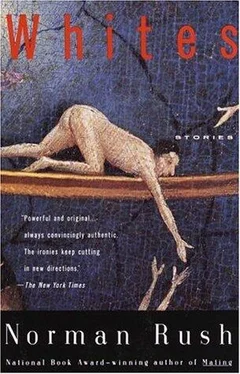One guy he was tired of was the number two at U.S. Information — Egan the blowhard and world’s foremost authority on sex in Botswana and the known world. Frank was tired of professional libertines, especially if they were on the United States Government payroll. Coming overseas had been an eye-opener on the subject of official Americans like Egan, who were less than gods, from the taxpayer standpoint. Egan was the mastermind behind the new thing of morale-building stag dinners for the men of America in Botswana. Frank had been once. No matter what you’d done, Egan had done it better. Somebody had made the mistake of using the phrase “naked broad.” So then Egan had informed him he didn’t know the meaning of the word “naked”—meaning that there was some elite whorehouse near Athens where all the women were shaved smooth as eggs. Their heads were shaved, their pubic hair, axillary hair, eyebrows. Egan had been there, naturally. The women were depilated every day. The women were oiled all over, shining, and they were different races. Only if you’d been there could you say you’d experienced lovemaking to a naked broad, had the real experience, like Egan. Egan was close with the bishop. He was a Father of the Year type. Actually, a loudmouth was the perfect choice for information service officer. What was a grown man doing showing Audie Murphy war movies to the Botswana Defense Force? Frank detested Egan, the hypocrite. Frank toasted the martyrs of science versus the church, like Giordano Bruno. There were others.
With its big block letters, Ione’s itinerary was like a poster. You couldn’t escape it. Ione’s handwriting was showing no sign of aging. Frank wore glasses for reading and she didn’t. His signature was less of a work of art than it had been. He looked at the radio. In less than a year they’d be back home where they could follow the destruction of the world by nationalism and religion in crystal-clear broadcasts on all-news radio. In Botswana, the radio was an ordeal, partly because they had never invested in an aerial. He was tired of waltzing around the room carrying the radio, trying to find the one crux of radio waves that would allow him to pick up something intelligible. The news would be about Beirut again. Beirut was religion armed to the teeth and having fun. He was tired of Beirut. Drinking this much was a change. It was fun. He was beyond his norm. Usually they never missed trying for the eight o’clock Armed Forces Radio news. Tonight he was going to skip it. Nine-tenths of the radio band in Africa was cockney evangelists. It was a shame that the minute the Batswana got literate they were engulfed in Bibles and tracts and fundamentalism, a nightmare. But he was going to take a pass on the radio because he was listening to something much better. It had rained hard, earlier, for three minutes. Now water was ticking onto the dripstones outside, a delicious sound and not long for this world.
He liked his worst bathrobe best, which was why he had dug it up from the bottom of the hamper. It must be after eight. Tick-tock, where was their clock? Except for Ione’s African arts and crafts collection, there was very little in the place that would have to go back to New Jersey with them when they left. They could have a jumble sale for everything else. Basically, they were camping. This was a government house and they were living in it like campers: they dealt with the huge furniture as just another exotic thing to be made use of, like a strange rock formation. The government procured the furniture in South Africa. Ione liked to call the Republic of South Africa a “taste-sink.”
They were camping. That was partly why they had done only the bare minimum on the grounds. The other part was to get at their intolerable neighbor, Benedict Christie, or as Ione liked to call him, Imitatio Christie. They lived in Extension Six, an enclave of upper-level civil servants, Batswana and expatriate. They were at the outer edge of the extension: raw bush began outside their fence on one side. Christie wanted every expatriate yard to be a model of husbandry, like his, with row after row of cabbages to give to the poor. Christie was useful in one way, because they could tell the time by him. He went to bed at nine-thirty on the dot. In Christie’s house, only one room was ever lit at a time. He was a model of parsimony not to be believed. Even where people had fixed up their yards, Ione had never found the out-of-doors in Botswana that inviting. There were more lizards in the trees than birds. It was important to be alert about snakes. Ione had never adapted. Frank decided to open up the Cape Riesling they’d been saving. He went to get it. Coming back, he went through the house pulling the curtains shut on all the windows and pausing to listen for the sounds that had been bothering him. There was nothing much. He should check on the time. He chronically took his wristwatch off when the weekend came, locking it away. Not to secure it, but because he liked the symbolism. In the government houses, everything locked: closets, the pantry, dresser drawers, the credenza with his watch in it, all the interior doors. They had pounds of keys to deal with.
He was holding the wine in his mouth for longer than usual before swallowing it, for no particular reason.
Our suffering is so trivial, he thought. His thought surprised him. He wondered what suffering he was talking about, aside from being in need sexually, thanks to Ione, a minor thing and natural under the circumstances. He was in favor of her vacation. He swallowed his Riesling. Africa was suffering, but that wasn’t it. He knew that much. Because a central thing about Africans was how little they complained. Whites complained at the drop of a hat. Africans would walk around for weeks with gum abscesses before coming in for treatment, even when treatment was next to free. People were losing their cattle to the drought, and cattle were everything. But the Batswana kept voting for the ruling party and never complaining. His point eluded him. He gave up. Occasionally it hurt him to think about Susan, because in a way he had lost her to superstition, to Lutheranism. If you told anybody that, they would think you were kidding, claiming to be suffering over something trivial. They would say you were overreacting. His daughter was a deaconess, the last he’d heard. That was up to her. What was a deaconess?
He drank directly from the bottle. He liked the sound of liquid going into him. He thought, It’s easy to forget how remarkable it is that every member of the male race carries a pouch hung on the front of our body full of millions of living things swimming into each other. He cupped his naked scrotum to see if he could feel movement. He thought he could. The wine reminded him of Germany. Everybody should see the Rhine. But when he’d suggested it, Ione had said she hated Germany. So did the Germans, apparently, who were ceasing to reproduce — voting with their genitals, so to speak. Germany was green and beautiful. So why were the Batswana reproducing like Trojans in their hot wasteland of a country? Fecundity was everywhere. Women began reproducing when they were still children. Everywhere there were women with babies tied to their backs and other babies walking along behind them. At thirteen or fourteen they considered themselves women. Batswana schoolgirls looked like they were getting ready for sex from menarche onward. They went around with the back zippers on their school uniforms half-undone, their shoes unlaced half the time, as if they were trying to walk out of their clothes. They were always reaching into their bodices, was another thing, feeling and adjusting themselves. They were unselfconscious. He wondered if they knew what that kind of thing looked like to makhoa? Batswana men didn’t seem to notice it. He reminded himself not to judge. Women in general were a closed book, Ione excepted. And women in somebody else’s culture added up to two closed books. What could a lakhoa really know about the Batswana, especially the women? A lot of things were said about them that were probably lies — for instance, that they had enlarged labia because their mothers encouraged them to stretch them as a sign of beauty. That was in the north. Probably it was no longer done. It was called macronympha.
Читать дальше












